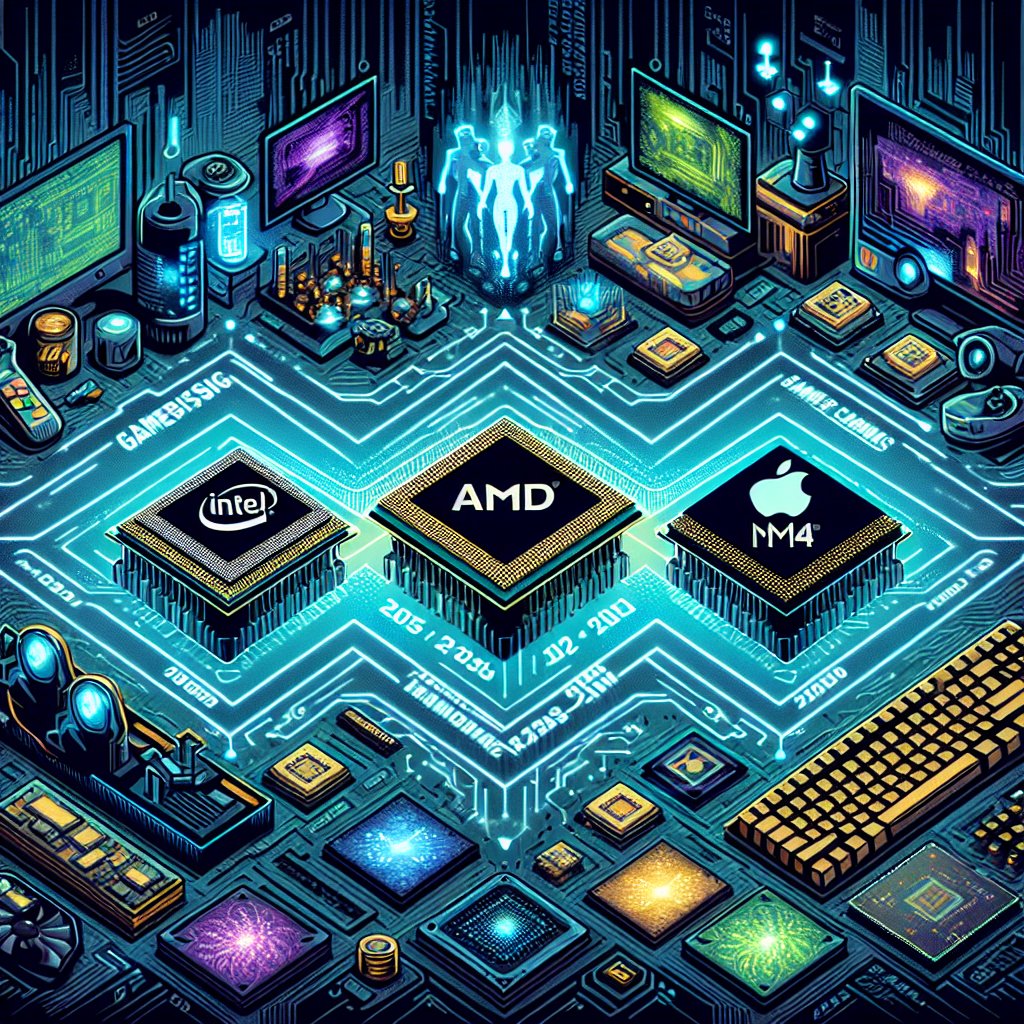Best CPUs for Gaming in 2025: Intel vs. AMD vs. Apple M4
Introduction
In 2025, the competition among central processing units (CPUs) tailored for gaming has intensified, with major players Intel, AMD, and Apple releasing products that push the boundaries of performance, efficiency, and integration. Intel and AMD have long been dominant forces in the gaming CPU market, continually evolving their architectures to deliver enhanced processing power and improved energy efficiency. Intel’s latest offerings focus on leveraging AI-driven technologies to optimize gaming performance, while AMD continues to enhance its Ryzen series with advanced core counts and clock speeds.
Apple, traditionally known for its strong presence in the mobile and desktop computing sectors, has also made significant inroads into the gaming CPU market with its M4 chip. This chip is part of Apple’s own silicon lineup, designed to deliver exceptional performance in both desktop and mobile platforms. The M4 chip integrates seamlessly with Apple’s software ecosystem, offering optimizations that are specifically tailored for gaming applications.
The landscape in 2025 shows a clear trend towards more specialized and powerful CPUs, with each manufacturer targeting specific aspects of gaming performance. This includes real-time ray tracing, AI-enhanced graphics, and ultra-responsive gameplay experiences. As these companies continue to innovate, the choice between Intel, AMD, and Apple CPUs depends increasingly on specific gaming needs, budget considerations, and brand loyalty.
Best CPUs for Gaming in 2025: Intel vs. AMD vs. Apple M4
In the ever-evolving landscape of gaming technology, the central processing unit (CPU) remains a critical component for an optimal gaming experience. As we step into 2025, the competition among CPU manufacturers has intensified, with Intel, AMD, and Apple leading the charge, each offering unique advantages that cater to different gaming needs.
Intel, a long-standing giant in the CPU industry, continues to impress with its latest release, the Intel Core i9-13900K. This processor is built on Intel’s refined 7nm process technology, which significantly enhances its efficiency and performance. The i9-13900K features a hybrid architecture that combines high-performance cores with efficient cores, allowing it to dynamically adjust to workload demands. This makes it particularly adept at handling AAA games that require high computational power for the best graphics and physics simulation. Moreover, Intel’s deep learning boost technology has been tailored to enhance AI-driven tasks within games, providing a more immersive and responsive gaming environment.
Transitioning to AMD, the Ryzen 9 7950X3D stands out as a formidable contender. AMD has taken a significant leap with its 3D V-Cache technology, which stacks additional cache directly onto the chip. This innovation drastically reduces latency and increases bandwidth, which is crucial for gaming scenarios where speed and quick data retrieval are paramount. The Ryzen 9 7950X3D also excels in multi-threaded environments, thanks to its 16 cores and 32 threads, making it an excellent choice for gamers who also engage in content creation, such as live streaming or video editing.
Meanwhile, Apple has made remarkable strides with its Apple M4 chip, designed specifically for its Mac lineup. While traditionally not the first choice for gamers, the M4 chip’s performance metrics are compelling. Built on Apple’s advanced 5nm process, the M4 integrates both high-performance and high-efficiency cores, similar to Intel’s approach but optimized for macOS and its software ecosystem. The M4 chip supports Metal 3, Apple’s latest graphics technology, which enhances gaming experiences by improving graphical fidelity and load times. Although the range of games available on macOS is more limited compared to Windows-based systems, the titles that are available run exceptionally well on M4-equipped machines, making it a viable option for gamers who prefer Apple’s ecosystem.
Choosing between these CPUs depends largely on the user’s specific gaming needs and existing hardware ecosystem. For gamers who prioritize raw power and broad compatibility with a wide range of games, both the Intel Core i9-13900K and AMD Ryzen 9 7950X3D are excellent choices. Intel’s offering might appeal more to those who value adaptive performance and AI enhancements, while AMD’s processor could be the go-to for users who need robust multi-threading capabilities for multitasking performance.
On the other hand, the Apple M4 might attract users who are already integrated into the Apple ecosystem and appreciate the seamless interaction between hardware and software that Apple offers. Additionally, for gamers who are also creative professionals, the M4’s optimization for professional applications used in graphic design and video production can be a significant advantage.
In conclusion, the best CPU for gaming in 2025 ultimately hinges on balancing factors such as performance, ecosystem compatibility, and specific gaming or professional needs. Whether choosing Intel, AMD, or Apple, gamers have robust options each bringing something unique to the table, ensuring that they can find a processor that fits their gaming style and performance requirements.
Conclusion
As of 2025, the best CPUs for gaming from Intel, AMD, and Apple each offer unique advantages. Intel’s latest offerings excel in high single-threaded performance, making them ideal for gaming at high frame rates and resolutions. AMD continues to impress with its multi-core performance, providing excellent multitasking capabilities alongside competitive gaming performance. Apple’s M4 chips, while less common in traditional PC gaming setups, stand out in integrated graphics performance and energy efficiency, making them a great choice for mobile gaming platforms. Ultimately, the choice between Intel, AMD, and Apple M4 CPUs for gaming depends on specific user needs such as budget, preferred gaming platform, and performance priorities.



